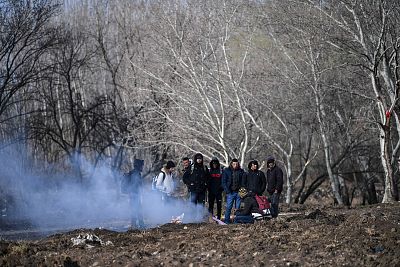Turkey said it would open the gateway to Greece, an apparent attempt to pressure the E.U. into taking more responsibility for Syrian refugees.
EDIRNE, Turkey — Sabah Radwan, 45, and her three sons sat on blankets on the side of the road in this town on the border with Greece, taking a break from their journey into no man's land.
 ADVERTISEMENT
ADVERTISEMENT
 ADVERTISEMENT
ADVERTISEMENT
She had taken heed of statements by the Turkish government last week that it was opening the border with Europe to refugees and had traveled here from Ankara, the capital, in search of a better life for her and her boys, ages 5 to 21.
They were now among a group of migrants waiting to cross into Greece, a member of European Union, where Radwan believes her youngest son, Taha, who has Down syndrome, would receive proper care.
"They say the border is open, and now they say the border is closed," said Radwan, originally from Idlib in Syria, the last rebel stronghold currently under attack from forces loyal to President Bashar al-Assad. "Why did they tell us to come here and we find that the borders are closed?
The escalating humanitarian crisis here has trapped thousands of Syrians between armed Greek border guards and Turkish officials accused of using the migrants' desperation as a geopolitical bargaining chip. And as migrants set up camp in hopes of finding a way across the border, Greece says it has stopped 35,000 from entering in just a few days.
Turkey's decision to open the border came after President Recep Tayyip Erdogan had threatened for months to "open the gates" of migration to Europe if the E.U. didn't support Ankara's plan to establish a "safe zone" in Syria where one million Syrian refugees could be returned.
Turkey says it cannot host any more Syrian refugees beyond the 3.7 million already in the country and blames the E.U. for not sharing responsibility for them. The E.U., in turn, has demanded that Turkey uphold its end of a 2016 agreement that provided it $6.6 billion in exchange for stemming the flow of migrants.
Athens, backed by the E.U., now accuses Ankara of deliberately goading the migrants into trying to cross into Greece. Images of migrants being tear-gassed by Greek authorities have led some migrants to wait on the Turkish side of the border, fearing for their safety, they said.
Tensions were heightened this week after Turkey claimed that Greek gunfire had killed one migrant on the Turkish side of the border, a claim Athens has flatly rejected, according to The Associated Press.
In and around Erdine, hundreds of migrants have been sleeping on the ground on the bus station or in fields throughout the city and in the countryside.
Abdulhameed Almohammad, 51, a doctor from Deir al-Zour, said he and his family were driving toward the border when Turkish police stopped the car and told them to walk the rest of the way.
"We are with our families and our children. Greece is not allowing us, and now Turkey is also not allowing us," he said.
Turkey has been tightening control of how this new move of migrants plays out in the media. Journalists are no longer allowed to visit the actual border crossing with Greece.
Turkey fears it could face another migrant wave as Russian-backed Syrian forces continue their offensive, which has already pushed hundreds of thousands toward the Turkish border since early December.
Polls have suggested Turkish citizens have widespread resentment toward Syrians, which was partly blamed for a major defeat of Erdogan's party in last year's mayoral election in Istanbul.
Turkey said it launched a military operation in Idlib after 34 of its soldiers were killed in an attack, leading to fears of a direct confrontation with Russia and a major escalation in the crisis. Rights groups and aid agencies have called for a ceasefire in Idlib and for help rescuing trapped civilians.
"This crisis demands the urgent attention of the world's leaders," David Miliband, president and CEO of the International Rescue Committee, said in a statement last week. "The parties to the conflict must feel pressure to end this assault on civilians before more lives are lost. Today's discussion about cross-border humanitarian aid must also make clear that there is no alternative lifeline for Syrian civilians outside of the cross-border mechanism."
Erdogan met with Russian President Vladimir Putin in Moscow on Thursday for talks over a potential ceasefire in Idlib.
In the meantime, Turkey has not said how long its change in migrant policy will remain in effect.
In the end, police allowed Radwan and her sons and dozens of other migrants to pass the barriers and head to the crossing.
"I cannot go back home. I don't have a home," Radwan said.
"I have nothing to go back to. If I go back, I have to start from the beginning," she added. "How could I have something to go back to? Forward would be better for me and my son."











